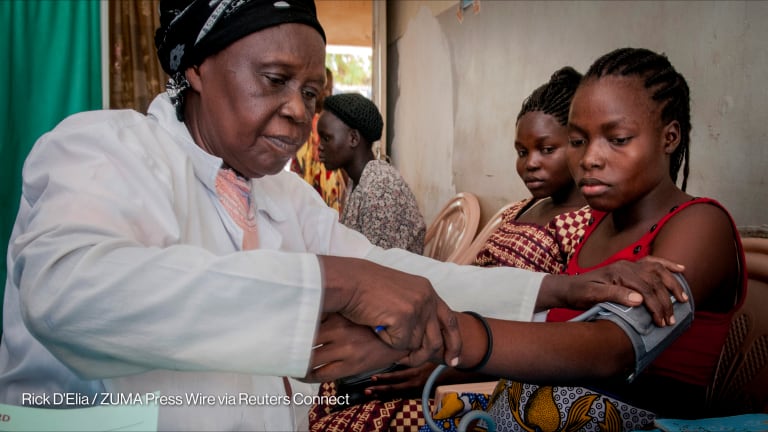
As development practitioners in global health have reflected back on the Millennium Development Goal era, many have noted significant progress against key goals, including reductions in maternal deaths, child deaths under age 5 and new HIV infections. But one of the greatest accomplishments over the past 15 years is actually more of an idea: the collective appreciation for our need to invest in health systems strengthening.
This focus has been prominent at several recent cornerstone health events, including at the Measurement and Accountability for Health Summit that took place in Washington, D.C., in June 2015, where countries, global health leaders, civil society and development partners endorsed a roadmap to help countries track progress as they build resilient and sustainable systems for health while working toward the Sustainable Development Goals.
The road map’s core themes emphasize the importance of health monitoring and accountability lessons learned from the MDG era; good information systems and accountability mechanisms to implement the post-2015 agenda; and harnessing the “data revolution” to scale up desirable systems.
To anyone who has worked in global health for at least 15 years, it’s amazing to see the global health agenda putting digital health at center stage as one of the key pillars in health system strengthening.
Agendas are not just words; they drive investments by both governments and development partners. But if developing African countries are to truly harness future digital health investments to strengthen health systems, they will need to ensure that the right “infostructure” and institutional capacity are in place first.
Building ‘infostructure’ and open source solutions
Read related stories:
► FAO: Against Zika virus, no one can fight alone
► Combating meningitis in sub-Saharan Africa and what the future holds
The mindset shift toward digital health is critical. In the recent past, the global health agenda has focused, and rightly so, on disease-centered programs such as maternal and child health, HIV, malaria, tuberculosis and immunization — unfortunately at the expense of broader health system strengthening programs such as health infrastructure, health financing, medical equipment and digital health.
As a result, a number of African countries have invested and built strong vertical programs targeting specific diseases, but very few have invested in strengthening systems for health as a whole.
Needless to say they lack well-articulated digital health or health strategies, let alone a functioning digital health or e-health program. The absence of such a strategy leads to minimal investment in digital health; as a consequence, health information systems in Africa are still uncoordinated, fragmented and very limited in scope. The recent Ebola outbreak in West Africa highlighted the critical role of health information systems as a component of health system strengthening in protecting communities against all diseases.
While many African countries have not yet invested heavily in digital health, some of the best digital health implementations have occurred in Africa. For example, countries have boldly scaled up the use of technologies such as RapidSMS, an mHealth system that allows health workers in remote areas to share and receive information using mobile phones.
Most of these innovations have not yet been implemented to scale, but they represent a good opportunity for Africa to move faster than other continents in terms of creating and implementing viable digital health systems.
Developed countries such as the United States house a multitude of systems that do not “talk to each other,” largely because they were not built to do so. Reversing the situation can be extremely costly and even impossible. Countries in Africa can learn from this example — and should take advantage of this moment at which most of them lack complex systems and build the “infostructure” that is required for future systems to flourish in an interoperable manner.
As the information systems industry boomed over the past few decades, the developed world invested significant resources in buying licenses from corporates in order to use their proprietary systems. Today, as much as there is still room for proprietary systems in the health industry, there are now also many open-source alternatives all over the world, complete with communities to support them. An example of this is DHIS2, an open source system used in over 40 countries to collect, analyze and use health data.
Developers are creating new open source systems like this every day in almost every specialized area in health information systems. African countries should leverage the growth of these systems and communities as a way for them to implement cost-effective and sustainable solutions that cut the cost of planning and delivering care, while making health systems more efficient and effective in all areas.
Preparing for digital health: What’s next?
Global health commitments to invest in digital health can and certainly should aim at leveraging efforts and commitments readily available in Africa — from promising digital health pilots to scaled-up open source systems that support future innovations.
African countries can position themselves well to contribute to the architecture of future global digital health by:
• Putting the right digital health policies and governance structures in place.
• Developing digital health strategic plans and corresponding resources.
• Building an “infostructure” that can support existing and future digital health systems.
• Implementing information systems that are cost-effective and scalable.
• Evaluating and documenting achievements in digital health.
Some African countries, including Rwanda, Ghana and Kenya, have already done a good job in pushing ahead in these areas to set the right stage for digital health. Meanwhile, organizations and networks including the HealthEAfrica network created by HealthEnabled, Africa Network for Digital Health, and Africa Center for eHealth Excellence have also been launched to foster collaboration. We hope these countries and efforts will continue to foster “south-south” collaboration and ensure that when digital health investments come, Africa is ready.
To read additional content on global health, go to Focus On: Global Health in partnership with Johnson & Johnson.
Search for articles
Most Read
- 1
- 2
- 3
- 4
- 5








